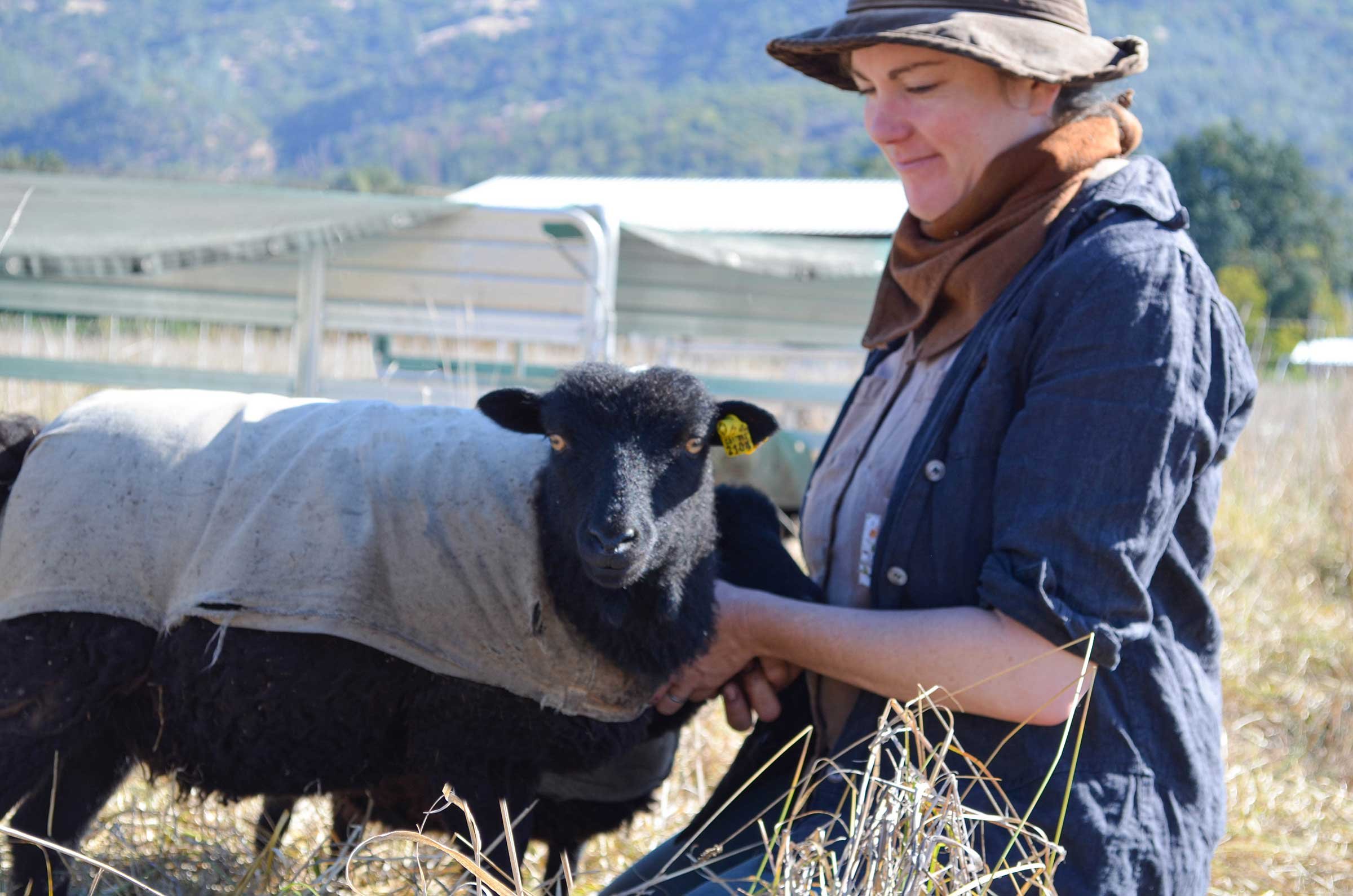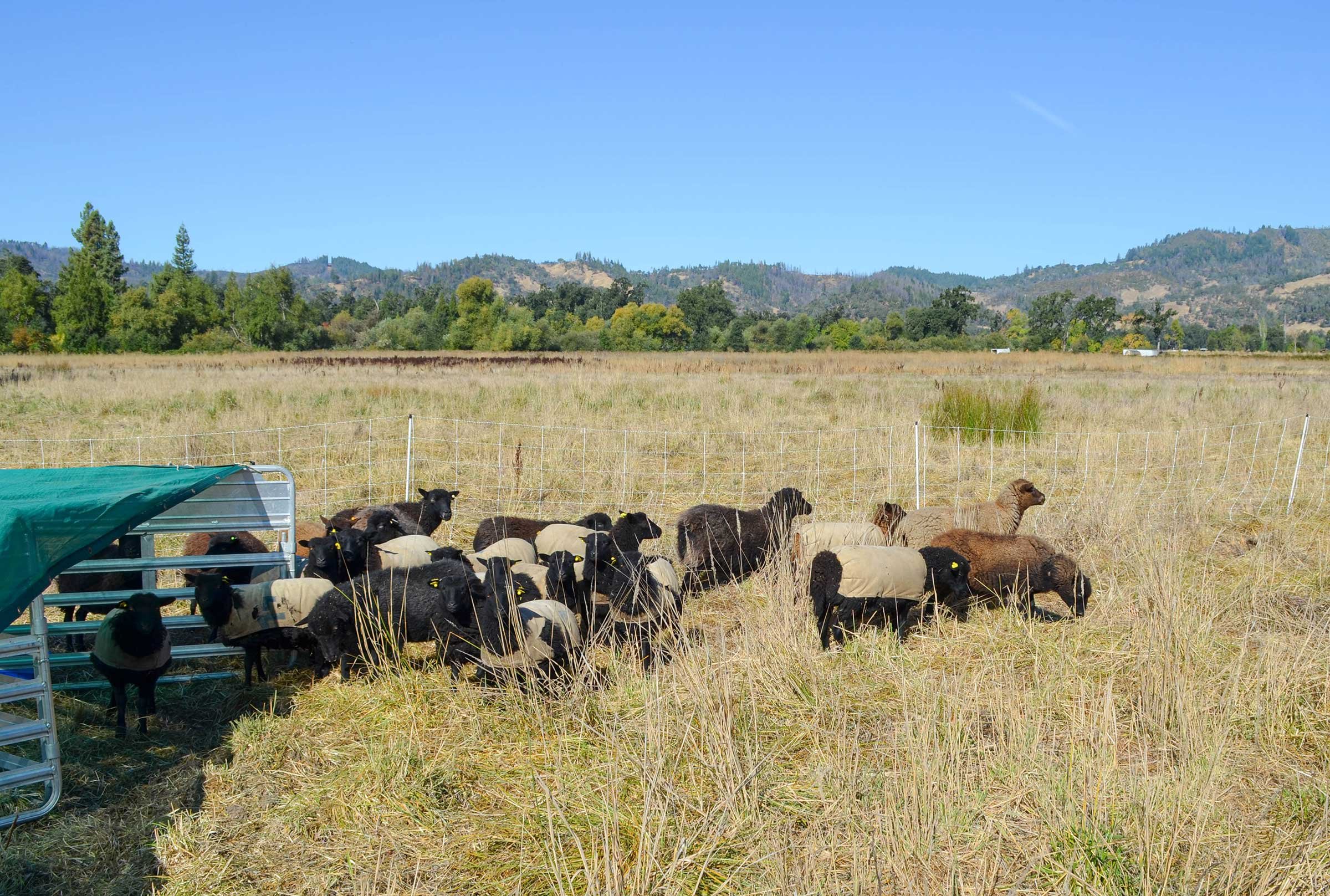Full Circle Wool

Tackling Climate Change with Tiny Sheep
by Torrey Douglass
What do sponges, wildfire safety, and 45 of the world’s smallest sheep have in common? The answer: Marie Hoff, a maker and shepherd living in Potter Valley.
Marie was in her late 20s when she decided that she’d had enough of the financial uncertainty of life in the Bay Area. Her post-college years had begun as a free-spirited time of living as cheaply as possible, working random jobs, and devoting the rest of her energy to creating and experiencing art with friends. But promising career openings for arts degree graduates are limited at the best of times; in an economy still reeling from the Great Recession, they had dried up faster than splashed paint. Eventually the grind of service jobs with no clear path to a more stable existence began to deflate her spirit. Marie knew it was time to take a step back, take stock, and figure out something new.
So began a period of reflection. Marie looked back on her patchwork of jobs and realized her favorite employment had been in the farmers markets. Meeting the farmers, selling the produce, and participating in a food system that was healthier for people and the climate aligned with her values and brought her joy. After growing up in Southern California suburbs, she’d been drawn to the Bay Area by its energy and artistic vibrancy. Now it was time to seek new pastures again.
Marie is warm, thoughtful, and patient, all good qualities in both a farmer and a friend. She reached out to contacts she’d made at the farmers markets and began spending time on their farms, working beside them, and learning all she could. “I loved the lifestyle,” she shares. “I thought, ‘This is where I’m supposed to be.’” She particularly loved the West Sonoma farms and, through housesitting and live/work arrangements, was soon able to shift her home base out of the city.
Marie spent some time living with her friend and mentor, Hazel Flett of Bodega Pastures, where she worked with sheep for the first time. Remembering that period, Marie reflects, “I liked moving around with them, shepherding them to new pastures and learning about their flock dynamics, seeing how my movement affected them and developed a relationship to them. And then how my movement and their movement impacted the land and grasses, how the relationship between me and the sheep affected the landscape.”
Not long after, Marie worked at Heart Felt Fiber Farm south of Santa Rosa, under the wise guidance of farmer and fiber artist Leslie Adkins. On a trip to the East Coast to meet other sheep ranchers, Leslie visited a Massachusetts farm where she encountered the smallest breed of sheep in the world: the Ouessant. Originally from the westernmost French island, Ile d’Ouessant, the sheep weigh around 50 pounds and stand 18” at the shoulder for ewes, 19” for rams. They are curious and gentle, yet hardy and independent enough to endure the cold wet winters in the hills of their home island.
Leslie was smitten by the Ouessant and purchased a pair for her farm. After returning to California, she convinced Marie to buy some of her own, and soon seven more joined the original two. Collectively, they were the first of the breed on the West Coast. Marie called her flock the Capella Grazing Project, aptly named after the shepherd star. She changed the name to Full Circle Wool after moving to Potter Valley three years later in 2016, not wanting to be confused with the Calpella community.
Full Circle Wool sells products made from wool provided by Marie’s herd and also sourced from other ranches in the region. She only uses wool that is Climate Beneficial™, described on her site as “a verification by Fibershed (501c3 nonprofit), confirming that the fiber is grown on a farm or ranch operating under, and actively implementing, a Carbon Farm Plan.”
Full Circle Wool products include wool sponges, handkerchiefs, skeins of beautiful yarn, and art hangings. It’s even possible to sponsor a newborn lamb. Sponsors get to name the lamb, visit it, and receive photo updates as it grows. They are sent wool from the spring and fall shearings, and can even attend a wool crafting class led by Marie. Not surprisingly, sponsorships, which open up in late October and early November, tend to sell out fast.
Wool products are ideal for climate conscious customers: sheep eat the grass to produce the wool, the wool is processed and used to make all sorts of items like sweaters, blankets, and rugs, and at the end of their life cycle, those goods can be composted and returned to the soil that grows the grass for the sheep. The weakest part of the cycle is the making of products—lots of wool gets thrown out because there are so few artisans to buy it. Restoring the infrastructure for processing to strengthen the overall market is a motivating factor behind Full Circle Wool.
Marie’s understanding of this cycle, as well as of the strengths and vulnerabilities involved in sheep ranching, can be traced to her work with the Fibershed, a nonprofit that develops regional fiber and dye systems while prioritizing economy, equity, and ecology. She served as the Producer Program Coordinator from 2016-2019, a multifaceted role in which she coordinated with the different producers, helped to organize events like the Wool & Fine Fiber Symposium and Fashion Gala, worked on the blog, managed the Climate Beneficial program, and oversaw in-person meetups for producers. “It taught me a lot of skills related to admin work that, while sometimes tedious, are really helpful in running Full Circle Wool,” Marie remembers. “I learned a lot about the different producers in Northern California, the different land bases, the different fibers and what landscapes they grow on, and carbon farming.”
Today Marie’s herd numbers 44, with 10 ewes, 14 lambs, 16 wethers (castrated males), and 4 rams. There is one Black Welsh Mountain Ram to maintain genetic diversity, since it’s challenging to purchase and ship new purebred Ouessant from afar. The flock provides more than just wool for Marie’s products. They are uniquely designed for wildfire fuel abatement to make properties more fire safe. Thanks to their short stature, attributed to the poor food sources of their home island, the sheep evolved into indiscriminate browsers (who eat brush and leafy branches) and grazers (who eat grasses and ground plants). Plants passed over by more finicky beasts, like poison oak and coyote brush, are deluxe entrees for the Ouessant. This is one reason they are so hardy and can thrive even in drought years. And thanks to their small size, they can eat down brush and tall grasses without damaging the land by erosion the way larger hoofed animals do. They leave nothing behind but cleared pastures and enriched soil from the nutrients their waste leaves on the land.
Vineyards like to hire the herd in January or February, right before bud break. The sheep eat down the cover crop when it is high but has not yet gone to seed. Ewes are best for vineyards, as the males’ enthusiasm can damage vines. The wethers are excellent for general fuel abatement, usually in March or April when the vegetation is thick and green after winter’s rain.
Marie likes to consider the sheep and what they provide from a holistic perspective. “If you think about it, the sheep are turning accumulated fire fuel into sponges and leaving the soil improved in the process,” she observes. The sponges are popular and sell out frequently, which is not surprising—all sponges need to be replaced on the regular, but wool sponges can be composted after use, while their synthetic counterparts end up in the landfill, or, worse, shred into microplastics that endanger ocean life. The challenge of keeping the products in stock reaffirms Marie’s take that manufacturing is the weakest part of the “Full Circle” that inspires her work. But with the patience, creativity, and determination she’s exhibited so far, Marie and Full Circle Wool are equipped to take on the challenge.
Full Circle Wool
PO Box 123, Potter Valley, CA 95469
FullCircleWool.com





